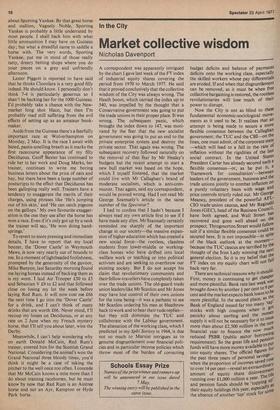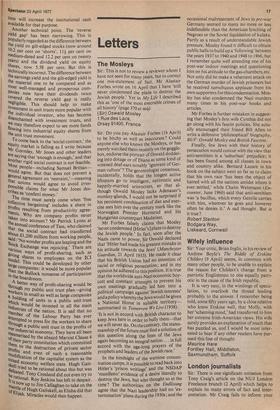In the City
Market collective wisdom
Nicholas Davenport
A correspondent was apparently intrigued by the chart I gave last week of the FT index of industrial equity shares covering the period from 1970 to March 1977. He said that it proved conclusively that the collective wisdom of the City was always wrong. The Heath boom, which carried the index up to 540, was impelled by the thought that a Conservative government was going to put the trade unions in their proper place. It was wrong. The subsequent panic, which brought the index down to 147, was motivated by the fear that the new socialist government was going to put an end to the private enterprise system and destroy the private sector. That again was wrohg. The subsequent recovery followed naturally on the removal of that fear by Mr Healey's budgets but the recent attempt to start a new bull market was based on the hope, which I myself fostered, that the market could live with Mr Callaghan's brand of moderate socialism, which is anti-communist. That again, said my correspondent, would be proved wrong. Had I not read Mr George Szamuely's article in the same number of the Spectator?
I had to confess that I hadn't because I always read my own article first to see if I have made any slips. Mr Szamuely certainly reminded me sharply of the important change in our society—the massive expansion of higher education which has created a new social force—the rootless, classless students from lower-middle or workingclass homes who have drifted into local welfare work or teaching or into political activism and are seeking to overthrow our existing society. But I do not accept his claim that revolutionary communists and their fellow-travellers have completely taken over the trade unions. The old-guard trade union leaders like Mr Scanlon and Mr Jones may have lost control of their ownAmions for the time being—it was a pathetic to see Mr Scanlon ordering his men at Heathrow back to work and to hear their rude replies— but they still dominate the TUC and collaborate with the Labour government. The alienation of the working class, which I predicted in my Split Society in 1964, is due not so much to Marxist intrigues as to genuine disgruntlement over financial policies and in particular income policies which throw most of the burden of correcting
budget deficits and balance of payments deficits onto the working class, especially the skilled workers whose pay differentials are eroded. If and when that disgruntlement can be removed, as it must be when free collective bargaining is restored, the rootless revolutionaries will lose much of their power to disrupt. Now the City is not as blind to these fundamental economic-sociological move ments as it used to be. It realises that an attempt is being made to secure a more flexible consensus between the Callaghan government, the TUC and the CBI—on the lines, one must admit, of the corporate state —which will lead to a fall in the rate of Inflation without the rigidities of the last social contract. In the United States President Carter has already secured such a
flexible consensus—or, as he put it, a 'framework for consultation'—between
leaders of the government, business and the trade unions jointly to combat inflation on a purely voluntary basis with wage and price controls strictly ruled out. Mr George Meaney, president of the powerful AFL" CIO trade union caucus, and Mr Reginald
Jones (GEC), head of the Business Council,
have both agreed, and Wall Street has recovered and gone well ahead on the
prospect. Throgmorton Street would follow suit if a similar flexible consensus could be secured here. It is not impossible—in spite of the black outlook at the moment- because the TUC caucus are terrified by tile thought of the Iron Lady winning the next general election. So it is my belief that the FT index on my equity chart will not fall back very far. There are technical reasons why it shouldFirst, money is continuing to get cheaPer
and more plentiful. Bank rate last week was
brought down by another 1 per cent to 9 Per cent and the market expects bank loans to he more plentiful. In the second place, as ale, Bank of England issued far too manY .taP stocks with high coupons when It got panicky about sterling and the mo, neYe supply it will not be necessary for it to issu more than about £2,500 million in the newti financial year to finance the now mu reduced PSBR (public sector borrowi°ng requirement). So the great life and Pens, funds will have more money available to put equity shares. The official figures to the past three years of personal savings _ when the proportion of incomes saved. rose to over 14 per cent—reveal an extraordinanY. amount of equity share disinvestnle: running over £1 ,000 million a year. The lite and pension funds should be'tOPPtrigUP their equity holdings this year, especially 4; the absence of another 'tap' stock for sore
time will increase the institutional cash available for that purpose.
Another technical point. The 'reverse Yield gap' has been narrowing. This is Popularly regarded as the difference between the yield on gilt-edged stocks (now around 10.2 per cent on `shorts', Ill per cent on rnedium-dated and 12.2 per cent on twenty Years) and the dividend yield on equity shares, now 5.58 per cent. But this is technically incorrect. The difference between the earnings yield and the gilt-edged yield is the material one to be compared and as Most well-managed and prosperous companies now have their dividends twice covered the reverse yield gap is really negligible. This should help to make Investment in unit trusts more popular with the individual investor, who has become disenchanted with investment trusts, and we may therefore expect to see more funds Owing into industrial equity shares from the unit trust movement. To come back to the 'social contract,' the equity market is falling as I write because Mr Gorinte-,
y Mr Jones and other leaders are saying that 'enough is enough,' and that another rigid social contract is not feasible. Most people—including Samuel Brittanwould agree. But that does not prevent a general agreement on 'restraint,'—meaning that unions would agree to avoid irresPonsible claims for what Mr Jones describes as 'confetti money.' The time must surely come when 'free collective bargaining' includes a share in Profits resulting from productivity agree
tents. Why are company profits never taken into account ? Mr Patrick Lyons at the annual conference of Tass, who claimed that the social contract had transferred about £1,200 million from working people, sa_ id: 'No wonder profits are leaping and the Stock Exchange was rejoicing.' There are v,r■ous ways of profit-sharing, such as giving shares to employees on the ICI rThis could be developed by other I,a,rge companies: it would be more popular !Ilan the Bullock nonsense of participation in the boardroom. A better way of profit-sharing would. be 'rough my public unit trust plan—giving Workers in small as well as large companies a 1..olding of units in a public unit trust "'filch Would be invested in all the main Industries of the nation. It is sad that no 1,11,!mber of the Labour Party has ever 'ti..1‘empted to press for the workers to share ,'".ugh a public unit trust in the profits of "ur Industrial economy. They have all been tti__esmerised by the absurd Marxist Clause 4 °t.t their party constitution which committed nein to the destruction of private sector Profits and even of such a reasonable Modification of the capitalist system as the r11_1 Med economy welfare state. Hugh Gait'tell tried to be rational about this but was lefeated. Tony Crosland did not even try to ?e.rational. Roy Jenkins has left in despair. 1 It Is now up to Jim Callaghan to take on the antle of Hugh Gaitskell, as Elisha did that .11..tah. Miracles would then happen.



































 Previous page
Previous page